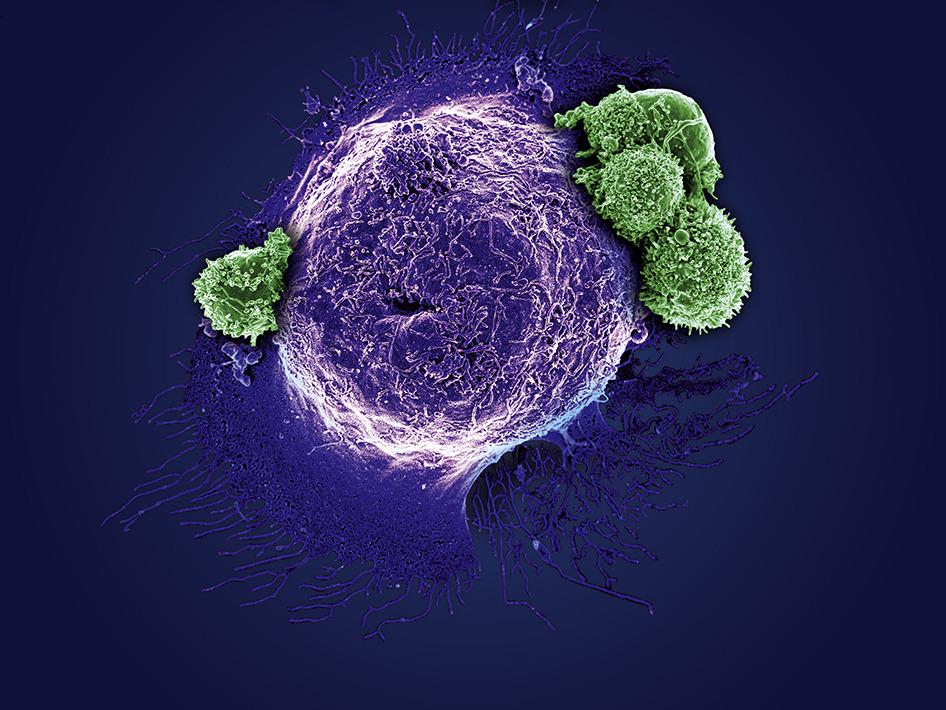A promising new cancer immunotherapy approach known as T cell receptor (TCR) therapy harnesses the immune system's T cells to target and destroy cancer cells. In TCR therapy, T cells are collected from a patient's blood and engineered in the laboratory to recognize specific cancer antigens, or proteins expressed on cancer cells. These engineered T cells are then reinfused into the patient, where they can seek out and eliminate cancer cells bearing those target antigens throughout the body.
Workings
In nature, T cells play a vital role in the immune system's ability to identify and destroy cancerous and infected cells. They accomplish this through T cell receptors (TCRs) on their surface that can recognize pieces of proteins called antigens. In T cell receptor (TCR) TCR therapy, T cells are modified using various gene transfer techniques to give them a new, cancer-specific TCR. This allows the T cells to target antigens that are aberrantly expressed by cancer cells. After being expanded and activated in the lab, millions of these engineered T cells are infused back into the patient where they can launch a coordinated attack against the cancer.
Targeting Cancer-Specific Antigens
One of the keys to T cell receptor (TCR) therapy is identifying antigens that are exclusively or predominantly expressed by cancer cells. Some potential antigen targets that are currently being explored include cancer testis antigens, differentiation antigens, and mutated neoantigens that arise from cancer-specific mutations. By zeroing in on antigens unique to cancer, T cell receptor (TCR) therapy aims to eradicate tumors while sparing normal, healthy tissues. Researchers are working to map the antigen landscape of various cancer types to uncover more promising targets for clinical development.
Advantages Over CAR T-Cell Therapy
While chimeric antigen receptor (CAR) T-cell therapy has achieved remarkable success against blood cancers, T cell receptor (TCR) therapy may offer some advantages. TCRs can recognize intracellular as well as cell surface antigens in a more natural, MHC-restricted way. This property allows T cell receptor (TCR) therapy to target a wider range of cancer-associated proteins, including those only expressed inside tumor cells. Furthermore, targeting intracellular antigens may help prevent tumor immune evasion through antigen loss. Finally, TCRs are safer and less likely to cause toxicities seen with some CAR T-cell therapies since they do not rely on antibody-based targeting.
Early Clinical Trials Show Potential
The first T cell receptor (TCR) therapy clinical trials have demonstrated promising signs of efficacy and safety. In a trial for melanoma, patients receiving a TCR targeting the MAGE-A3 cancer antigen showed one partial and two stable responses out of ten evaluable patients. Another trial testing a TCR against NY-ESO-1 in synovial cell sarcoma and multiple myeloma yielded one partial response and several episodes of stable disease. Larger phase 2 studies are ongoing in several solid tumor types to further assess outcomes and identify patient populations most likely to benefit. Researchers are also working to refine TCR engineering approaches to improve product potency, persistence, and ability to overcome immunosuppression in tumors.
Manufacturing Challenges Must Be Overcome
While the early results are encouraging, widespread adoption of TCR therapy faces significant manufacturing challenges that will need to be overcome first. Isolating clinical-grade T cells, engineering them with tumor-specific TCRs, and ensuring full functionality during expansion requires complex processing in good manufacturing practice facilities. Developing more standardized, scalable, and cost-effective production methods is critical. Companies are attempting to streamline manufacturing through process intensification, use of better viral vectors, and selection of optimized TCR candidates. With more investment and innovation, the goal is to make customized TCR therapies affordable and accessible to larger patient populations.
Future Outlook
As the fundamental science of TCR isolation, engineering and clinical application continues to rapidly evolve, T cell receptor (TCR) therapy shows great potential as a form of personalized treatment against cancers. Its ability to recognize both intracellular and cell surface proteins may eventually allow it to surpass CAR T-cell therapy against certain tumor types. Combining TCR therapy with other immunotherapies could enhance outcomes even further. Looking ahead, as manufacturing hurdles are cleared, the field hopes to conduct larger randomized clinical trials and gain regulatory approvals. With ongoing improvements, TCR therapy may transform cancer care by unleashing the full power of T cells against the disease.
Get more insights on this topic: https://justpaste.it/aobyk
About Author:
Priya Pandey is a dynamic and passionate editor with over three years of expertise in content editing and proofreading. Holding a bachelor's degree in biotechnology, Priya has a knack for making the content engaging. Her diverse portfolio includes editing documents across different industries, including food and beverages, information and technology, healthcare, chemical and materials, etc. Priya's meticulous attention to detail and commitment to excellence make her an invaluable asset in the world of content creation and refinement. (LinkedIn - https://www.linkedin.com/in/priya-pandey-8417a8173/)
*Note:
1. Source: Coherent Market Insights, Public sources, Desk research
2. We have leveraged AI tools to mine information and compile it

